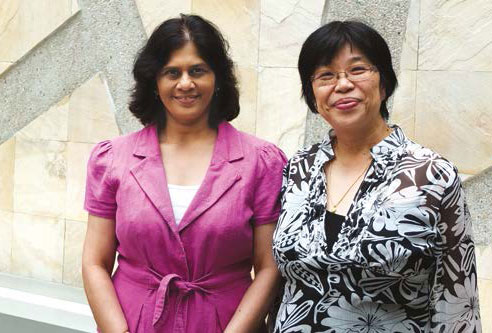Thanks to an initiative called TrustedCare, KKH patients choosing Caesarean section can now have a better peace of mind.
This nine-part series developed with the SingHealth Office of Strategy Management provides an overview of how the SingHealth Duke-NUS Academic Medical Centre (AMC) is approaching the health challenges facing the nation.
The elective Caesarean delivery process has been redesigned for an improved and safer patient journey at KKH.
Approximately 3,500 mothers each year require Caesarean section to deliver their babies at KK Women’s and Children’s Hospital (KKH). When a mother undergoes a Caesarean section, she faces the risks of major surgery.
Thanks to an initiative called TrustedCare, KKH patients choosing Caesarean section can now have a better peace of mind.
Introduced in 2014, TrustedCare is a redesigned clinical pathway that aims to optimise the care of women going for elective Caesarean section. It provides uniform and evidence-based care for women during their journey, from consultation in clinic to discharge after delivery.
As an example of TrustedCare at work, during surgery, a patient’s internal organs may adhere to one another, causing complications. Adhesion barriers used to be commonly administered to prevent this. However, there has been no strong evidence to show the benefit of using adhesion barriers during an uncomplicated Caesarean section.
Now, the barriers are only used when there is a need, reducing costs by approximately $270 to $460 for each patient.
"The detailed clinical information captured has resulted in a standardised pathway, safer clinical outcomes and cost savings for our patients."
– Dr Shephali Tagore, Senior Consultant, Department of Maternal Fetal Medicine, KKH
TrustedCare optimises outcomes, reduces variability and is backed by data mined through an electronic database. Dr Shephali Tagore, Senior Consultant at the Department of Maternal Fetal Medicine who led the initiative explained, “TrustedCare’s electronic database integrates clinical, operational and financial data. It eliminates the need for physical transfer of files.
“More importantly, by capturing detailed clinical information, we have been able to come up with a standardised pathway for this procedure, eliminating unnecessary variations in practice, enabling safer clinical outcomes and cost savings for our patients.”
The idea for TrustedCare was inspired by the Geisinger Health System’s ProvenCare programme in Pennsylvania, US. The process and IT system supporting TrustedCare were designed by a multidisciplinary team led by Dr Shephali and Serene Chin, Deputy Director, Integrated Health Information Systems, with strong support from the leadership at KKH.
“For countless hours over a six to nine-month period, we sat down with other doctors, nurses and colleagues from the finance and IT departments to talk through the requirements and design the system,” recounted Dr Shephali. “It was tedious but the end results were worth it.”
Serene shared, “We process the data using SingHealth’s analytics platform, eHInTs, and present them as charts and graphs on a user-friendly dashboard. This way, clinicians and administrators can grasp the key information at a glance.”
“The data can be broken-down further to trace or analyse a particular record at the click of a button.”

Dr Shephali Tagore (left) and Serene Chin (right)
It took a year before the system became robust. Initially, doctors and nurses needed time to get used to entering clinical data electronically instead of on paper forms.
Dr Janice Tung, a Registrar at KKH, recalled, “Getting used to a new interface slowed down the process at first but my colleagues and I soon got used to it. It has helped me cover important information about the patient in the pre-operative assessment. The nurses also found it easier to read the print-outs instead of having to decipher doctors’ handwriting.”
Dr Pamela Partana, a second year Resident at KKH, added, “The structured format in TrustedCare prevents the risk of omission of data. Going digital also means that patient information can be accessed wherever and whenever needed. This is particularly useful in emergencies.”
Data from TrustedCare can also be used to perform clinical audits and change current practice.
For instance, after a Caesarean section, patients may get blood clots in the egs during bedrest. Some doctors prescribe compression socks to prevent the clots from forming, while others do not. A clinical audit using TrustedCare data revealed that the socks are beneficial to all Caesarean section patients. Since then, compression socks have become part of the standard care prescribed for every patient.
Moving forward, data generated can also be used to calculate bill sizes for different indications of elective caesarean section.
With TrustedCare, the barriers are only used when there is a need, reducing costs between $270 and $460 for each patient.
TrustedCare for elective Caesarean Section won the IT Excellence in Providing Quality of Care at the National Health IT Summit 2016, an annual event organised by the Ministry of Health Holdings, a testament to the success of this project.
TrustedCare has also been rolled out at the National Heart Centre Singapore for coronary artery bypass grafting and in Singapore General Hospital for total knee replacement surgery.
